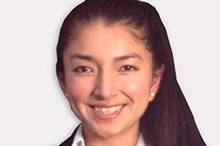

Maria Burgos is being honored as a Champion of Change for Foster Care
Growing up in California and studying on the East Coast for the past five years has made me realize my story is unique. School, service, and faith have been my light, even when it appeared that I was navigating a seemingly endless dark tunnel. It is this perspective that I hope to leave as my legacy.
Permanency became a front and center issue when my former foster parents blatantly told me they would not support me with making the down payment on the summer home I was going to sublet. The National Human Genome Research Institute had offered me a paid fellowship and I needed financial assistance to make the first rental payment so I could move to Bethesda, Maryland. Upon turning to my foster parents for help, they gave several reasons as to why they would not help me, including that at my age, they were making payments on their own home with their pooled income. With no other options, I opened a Credit Deposit with all of the small scholarships I had won during my senior year of high school. I had initially set these to mature in four years, but decided to withdraw to be able to pay the first month's rent. It was then that I also signed up for my first and only credit card. Both of these elements made it possible to make it in the Washington, D.C. area until I received my first paycheck.
During my senior year, I began to panic about my post-graduation plans. I did not have a safety net. This was on top of the fact that the prior year, on my 21st birthday, the Chafee Independent Living Services had been discontinued. It became that much tougher to remain calm because buying a good winter coat for all of the blizzards that hit the Northeast, medical treatments for unexpected pneumonia, textbooks, and even laundry would deplete my paychecks.
When I was younger and long-term foster care was the case plan goal for me, I was okay with the court’s decision. It was not until faced with my post-graduation transition that I realized a more solid foundation would have prevented a lot of panic attacks and bouts of anxiety.
I do not wish for another young adult to go through their college years choosing between paying for an asthma inhaler and getting a much-needed long-sleeve t-shirt. This is why I completely support President Obama’s efforts to allocate more funds to prevention services, to eliminate long-term foster care as case plan goal for teens, and to propose extending the Chafee Independent Living Services grant to age 22 when most students are seniors in college. This is less expensive than funding prisons or ongoing welfare support for unemployed adults.
Because of the experienced hardships that come from aging out of the system and because medicine is a respected part of the social structure, I plan to channel my energies and talents to capitalize on this platform to help educate stakeholders and legislators about the detrimental effects of foster care and poverty. This is why I want to be a pediatrician and part-time social worker. I wish help combat these educational and health effects by influencing policymakers to level the playing field and referring my patients to the educational, nutritional, legal, housing, and transportation services they require to ensure the best possible health and relationships. My medical expertise could then be shared with decision-makers to help improve the outcomes and the overall health and safety standards for minorities, foster youth, incarcerated populations, and the undocumented. I would also write articles on these intersections in order to assist in raising awareness on the distinct experiences faced by these populations.
I have the motivation to give my 110 percent and capitalize on various opportunities that can help me become the greatest public service servant I can be.
Maria Burgos is graduating from college in a few short days. She is a senior at Brown University.


